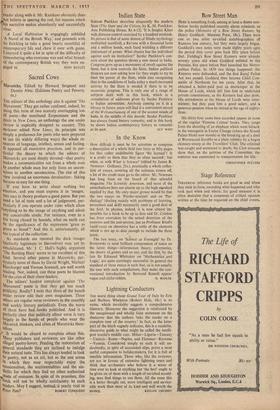Indian State SARDAR Panikkar describes elo q uently the modern. State (The
State and the Citizen, by K. M. Panikkar; Asia Publishing House, Rs 6-12). 'It is Jenghiz Khan with distance control exercised by a hundred methods. Its picture is that of some demon of Hindu mythology multiplied manifold, a Ravana with a thousand faces and a million hands, each hand wielding a different instrument of power. What chance has the individual against such an institution?' Sardar Panikkar's con- cern about the question shows a new mood in India. Congress grew up as a movement of revolt against the State, but it now controls the State. Indian political thinkers are now asking how far they ought to try to limit the power of the State, while also recognising that in the conditions of India today a much-increased activity by the State is needed if there is to be economic progress. This is only one of a range of subjects dealt with in this book, which is a compilation of addresses given by Sardar Panikkar to Indian universities. Anybody coming on it in a library in future years will find it a convenient record of the Weltanschauung of one of the acutest minds of India in the middle of this decade. Sardar Panikkar has always found history romantic, and in this book he shows Indian contemporary history as romantic


































 Previous page
Previous page